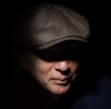Bert Carson's Blog, page 2
February 7, 2012
Holding out for a hero
WARNING - This post has four videos and 360 words. The videos have a total play time of less thansix minutes. Regardless of your readingspeed you should be able to read the text in less than two minutes. From start to finish this blog post will takeless than eight minutes of your time. Ifyou don't have eight minutes, come back when you do._______________________________________________
This is an election year. Once again we are going to have the opportunity to choose a leader fromone of the two political parties whose combined activities have gotten us in ahorrible situation. Not only are we introuble because of their foolishness, every country on the planet is feelingthe effects of their bumbling.
Here's the first video – you might have to watch it morethan once to believe the democrats actually paid an ad agency a lot of money toput this together.
Before you form a conclusion about my politics let me assureyou, I have none. That said, here's aRomney paid political ad. As of lastnight this ad had accumulated 787 likes and 2,249 dislikes. I don't believe Democrats are responsible forthe dislikes. I don't think Americanscare for either of their choices. 323,000 people have watched this and less than 10% bothered to indicatewhether they liked or disliked it.
America needs a hero and Americans know in their hearts that he or she isn't coming from eitherpolitical party. We are waiting for ahero.
I doubt if Clint Eastwood is any more interested in beingPresident of the United States than Lee Iacocca was. I am not expecting him to announce his candidacy, but I love that video. We have to find that spirit, that optimism,that willingness to get the job done.
In eastern traditions there is an ancient adage that goeslike this. When the student is ready,the teacher will appear. When thiscountry is ready; when you are ready and I am ready, the one who will lead usout of this quagmire of conflicting philosophies and immoral actions willappear.
It's time to getready America!
February 5, 2012
Extremely Loud & Incredibly Close
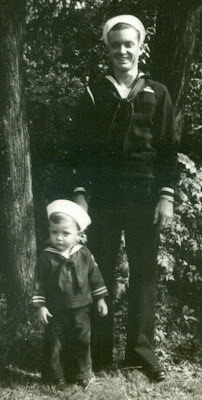
Last night I saw Extremely Loud and Incredibly Close. Lest you think this might be a movie review,let me say up front, it isn't. I'll justsay this about the movie; if you haven't seen it, put it on your list of moviesto see. If you have seen it you'll knowwhy it triggered the memory that led to this blog.The photo on the left was taken in1944, a couple of months after my second birthday. I'm the short sailor – the tall one is mydaddy, the second, Bertram Lee Carson. I'mthe third. I'll tell you about theoriginal in an upcoming blog. Daddy and I loved each other, but we weren'tclose. There were a couple of reasonsfor that. First, we were so much alikehe could read my mind simply by thinking what he did in the situations I foundmyself in, and second, because I failed to do the one thing he regretted neverdoing, finishing college. I graduated from high school in1960. Three months later, I enrolled inthe local junior college. I did prettywell there, so when I told my parents I wanted to go to a four year school, andI didn't want to wait until I finished at the community college, theyagreed. When I told them I'd chosenAlabama College, (now The University of Montevallo), near Birmingham, Alabamaand five hundred miles from our home in Palatka, Florida, they didn't try totalk me out of it, in spite of the extra cost of out-of-state tuition.I lasted a little over three monthsbefore dropping out a week before the end of my first semester. I'm not stupid. I belong to both Mensa and the International Society for Philosophical Enquiry. My problem was, I couldn't handle being 500 miles away from home with noclass attendance requirements. Or to putit another way, there was no time in my social schedule to attend class.A week before final grades werepublished, I left school and drove home. I pulled in my parent's driveway just as daddy was leaving forwork. He walked toward my car as Irolled the window down. A couple of feetaway he stopped, looked at me, and said, "I guess it didn't work out.""No sir, it didn't. I guess I was just wasn't ready for it."He nodded then said, "Go on in the houseand take a nap. Tell your mother I'll behome for lunch, and we'll talk then about what's next."The next thing was a job. They were plentiful in those days. I moved back into my old bedroom and that wasthat – for about a month. Then I startedthinking about my girlfriend at school, and how much I loved her. In an amazingly short period of time, I wasobsessed with the idea of going back to the school and making things right withher.A couple of days later, daddy came homefrom work, and I was waiting for him. Beforehe was three steps into the house I blurted, "I have to go back to theschool. I have to make everything rightwith my girlfriend. I know if I do thateverything will be alright… then I'll have some peace-of-mind about this."I paused and looked at Daddy, who was assilent as a statue, his eyes searching mine, I suspect for some sign ofsanity. Before he could say anything, Icontinued. "I know this will work. I have to do it. And… and… I don't have any money, so I needto borrow some." I thought for a second,did some figuring, then said, "Two hundred dollars ought to do it." Then I shut up.Daddy looked at me for a while. Finally, I saw what I thought was a smilestarting on his face and I thought, everythingis going to be OK. Then he spoke,and I knew I'd been wrong. "Son, I know you think that's the thingto do, but let me assure you, that's the last thing you need to do rightnow. You need to be still, physicallyand mentally. I won't loan you themoney to do anything I know isn't the right thing for you to do…"I don't know if he had anything else tosay or not. I jumped up, ran outside, gotin my car and headed for town. As Idrove, I began thinking, that's OK, I'll come up with the money I need. I'll go back to school, and I'll handle this.To make this part of the story a bitshorter, my good friend, boss, and later my brother-in-law for a while, knew agolden opportunity when he saw one. Minutes after storming out of the house, I sold Joe my custom built skiboat and my full collection of Snap On tools for $120.00. Joe still thinks it was funny, and I stillgrieve for the boat. I knew I was cutting it close toattempt a 1,000 miles (round trip) on $120.00, but a nineteen-year-old on amission can rationalize anything. Before the sun went down, I was heading west on Highway 100. Eight hours and $75.00 later, I was parkedbeside her dorm, which wasn't co-ed, so I huddled in the cold car until shecame out at 8:00 AM. She took one lookat me and shouted, "Bert Carson, I'm done with you. I don't ever want to see you again. Ever!" I was speechless. She spun on her right heel, and resumedwalking to her first class. I watchedfor a moment knowing there was nothing I could do to stop her. I also knew Daddy had been right. Then I thought, if I drive straight homemaybe daddy will never realize I've been gone. As I walked to the car, I mentally counted the money in my pocket anddid some math. I figured if I drove slowand didn't eat anything, I would be able to make it. The last thing in the world that I wanted wasto call daddy and ask him to bail me out.I headed back toward Montgomery. Just south of the city, I had a flattire. There was no money in the budgetfor tire repair, so I put on my spare, which was slightly larger than the otherthree tires. Going down the road, thecar looked like an old hound dog running a bit off center, which, as I thinkabout it, was very appropriate. I conserved gas like I never had beforeor since. Just outside of Lake City,Florida, with a single quarter left in my pocket, and so low on gas the gaugebounced off empty every time I hit a bump, I had my second flat tire.I coasted off the pavement onto thesandy shoulder in the middle of pine forest that seemed to stretch for ever inevery direction. I don't know how long Isat behind the wheel, before I heard a car coming. I stepped out just as a deputy sheriff pulledin behind my obviously disabled vehicle. Before he could say anything, I told him my story… the long sad versionof it, and he listened to every word. When I finished he said, "That's tough. If I had some money I would help you, but Idon't." He thought for a moment while Iwaited. Finally he smiled, and said, "There'sa store down the road a piece. I'll takeyou there. Maybe the owner will help youout."Minutes later he let me out in front ofwhat was obviously the general store for backwoods area. I was a bit hopeful, when I saw the singlegas pump and the weathered Pure Oil – Firebird sign in front and noticed therack of new and used tires beside the building. I took a deep breath, squared my shoulders, and marched into thestore. The owner called out, come onback, I having a bite to eat back here. He didn't miss a bite of his sandwichwhile I talked, trying not to think about how long it had been since I'd lasteaten. I must have talked for fiveminutes, and he hung on every word. Because he listened so intently, I was sure he would help me. I ended with, "and if you'll let me get atire and a tank of gas, I'll come back tonight and pay you."I stopped talking, and he stoppedeating. There was a long moment ofsilence, and then he shook his head, wiped his mouth, and said, "Son, I'd loveto help you, but I have a rule, and it's simple. I don't help anyone with a sad story and nomoney. I just can't afford to."I turned and headed for the door. I had taken five steps, and I remember everyone of them, when he called out, "Wait a minute.."I turned back toward him as he asked, "What'syour name?"I said, "Bert Carson."He was transformed. When he regained a bit of composure, heasked, "Son, why didn't you say that when you walked in?"I managed to ask what difference itwould have made and he said, "It would have made all the difference in theworld. You see, your daddy has calledevery gasoline distributor with stations on the highway between your house andwherever you were going in Alabama. Mydistributor called me this morning. Hegave me your name and he described your car. He told me that if you came in I should give you anything you needed,because it's all paid for. You didn'ttell me your name, and you weren't driving your car, so it took a while tofigure it out. Sorry 'bout that."I got gas, a tire, and breakfast. An hour later I pulled in the driveway, andonce again daddy was just leaving for work. He walked toward the car, as I rolled the window down. This time he grinned before he spoke and thenhe said, "It's good to have you home, son. Looks like you could use a nap."That happened fifty years and lot ofmiles ago. I've been in a many tightsituations since that day, but I've never quit because, thanks to daddy, I'vealways known that someone had my back. My only job was been to keep going the very best that I could, and that'swhat I've done.
February 4, 2012
Russell Blake - Blogs and Books
22 January 2012 by Russell Blake Published in: Uncategorized Tags:corruption, Fed Audit, federal reserve, financial crisis, goldman sachs 19 comments

I got an e-mail the other day from a friend who knows I follow events in the U.S. with some fascination – especially the financial situation, which in my opinion is moving from dire to bleak. If you aren't shocked and furious after reading the following editorial, I can't imagine what would do it.
The Federal Reserve just created more money than ever in the history of the US, and gave it to for-profit banks, many of which aren't American. How much? $16 trillion. You are reading that right. Trillion. The money went to US and foreign banks – Citigroup got $2.5 trillion, Goldman (which isn't a bank in any sense) got $800 billion Banks in the UK, France, Switzerland, Germany, Belgium… Everyone got hundreds of billions or trillions, bailouts which were never authorized by Congress or anyone but the Fed. Free money, from the American taxpayer, at unprecedented levels, for use however they felt like – and I'm guessing, it was to make big profits.
Here's the eerie part. None of this was reported. The GAO report linked in the article was ignored. Or if it was, it was so low key as to be invisible. I spent an hour online scouring the news services and couldn't find anything. No, instead I found the same blurb over and over – that the Fed was going to be handing the Treasury a check for $85 billion, the largest amount of interest ever. Apparently the US media didn't think it was noteworthy to point out that $85 billion was pennies, whereas the banks it had passed the money to made 2%, 3% or more. It was a news blackout that would have made Stalin-era Russia proud.
To put it all into perspective, the US total GDP is roughly $14 trillion. That's everything, including what companies like Microsoft, Apple, Ford, Amazon, Ebay, etc. all collectively generate. Every business in the US. Real estate. You name it. And the Fed created well over a year's total GDP worth of money for the express benefit of its bank friends, at the direct cost to the US population. The country paid to keep Barclays and Credit Suisse and Goldman profiting while it struggles to make ends meet. And there was no coverage. It's as though it never happened.
This is the biggest financial boondoggle in history. And it went unreported.
How scary is that, and what does it tell you about the media, as well as the government? Think long and hard.
The GAO report I have linked to below via the article says that the loans were repaid. Want to bet that means that the original term of the loan was repaid…with yet another loan from the Fed, but a "new" loan? That's what crooks typically do in rigged games, where they limit audits – as the Fed did with the GAO. It's Enron accounting – the "old" loan was "repaid" with the proceeds from a "new, different" loan. The boys on Wall Street invented dodgy tricks. Which is why they won't allow a real audit. Simple. If you have something to hide, you bluster and obfuscate and deny access. Why anyone would believe that the Fed is any different is beyond me.
I write conspiracy thrillers where a flawed protagonist fights insurmountable odds, usually against a system run amok. They're racing reads, but in the end we all know, or hope, that they're fiction. How much is actually fiction I never disclose – I prefer to leave that to readers to decide. Like Robert Ludlum, the line between reality and fantasy is blurry. Deliberately so. But this isn't a solicitation for you to buy my books. It's an alarm. A wake up call.
Here is the article on the $16 trillion .
This is real. This is your future. And nobody is telling you. You're being conned by the largest, most powerful, richest cartel the world has ever known – and you are paying for it. While most can't keep their heads above water, and are effectively indentured servants for the government's taxes, the mortgage bank, the car lender, and the insurance company, US and foreign banks were handed more money than anyone can reasonably imagine to use to make even more money.
If this sickens you, or if you didn't know this, please hit the Stumbleupon button (little green one below) and e-mail this blog URL to everyone you know. It's about time someone told you the truth, even if it hurts. Or do nothing, and wonder why your children will live in relative squalor.
Disclosure: I live in Mexico, a country with its own corruption problems, which are pervasive and non-trivial. But compared to what just happened with the Fed, Mexico is a Swiss bank in terms of integrity, and the Fed is a Moroccan rug merchant. No exaggeration. None required. So don't attack me. I'm just alerting you to the biggest story of your lifetime, and your children's lifetimes. What you do from here is up to you. Most will likely try to pretend it didn't happen, or doesn't matter. That didn't work so well for the Romans.
Here's Russell's Amazon Author's PageRegarding the Writers and Readers Tribe - we have twelve openings left and we would love to have you. Read my blog post The Indie Writer Two-Step to Success and let me know if you'd like to join us.
February 1, 2012
Why I Write by R.S. Guthrie
We've each blogged on the topic - Why I write.
Here's Rob -
___________________________________
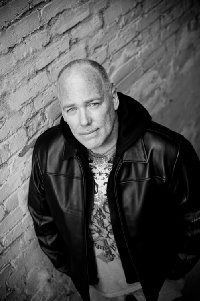 Why I Write by R.S.Guthrie
Why I Write by R.S.GuthrieWhen asked this question, as I was recently in being invitedto guest blog on the subject with my great writer pal Bert Carson (THANKS,BERT!), it always gives me pause. Not because the reasons are too deep or dark;not because there is no answer; but rather because it's a bit like answeringthe question "why do you breathe?"
Think about it.
Why do you breathe?
The answer is not, by the way, "to stay alive"—that is thereason why we must breathe. Thinkabout why you breathe. You certainlydon't have to think about it. Breathing is triggered by an automatic responsewith strength relative to the level of oxygen in the environment. That's whyyou don't have to think about it. Your body just does it. Above all else, in fact.
If you've never heard of them, freedivers are extreme sport individualswho attempt to reach incredibledepths while holding their breath (the record for men's free immersion dive wasset in 2010 at 380 feet—a breath that was held for over four minutes). The breathingresponse can be so strong for freedivers that ignoring the urge to take abreath becomes one of the biggest (and most critical) challenges thesesuperhuman breather-holders face.
Well, I can't say that my need to write is quite thatoverwhelming, but it really is something that has been in my bones since I canremember. It is truly an act that doeshelp me to survive—it relaxes me; allows me to release the words that have beenbuilding up inside me, needing escape; it also causes me an adrenaline-likeinflux of positive thought and confidence.
Why do I write, then?
To LIVE.
I actually wrote the following a few months ago:
"To the writer, the craft is like BREATHING. You'd neverforget to draw a breath; don't forget to WRITE."
I've since wanted to amend that statement. I'm no longerconvinced that those who feel writing deep in their souls would be capable of forgetting to write, any morethan a human being would be capable of forgetting to breathe. My previous statement implies a choice. There is nochoice. If you are a writer, you needto write.
Why do I write, then?
Because I MUST.
Every person has a voice. And it's not necessarily a vocalthing. I personally abhor public speaking. I hate doing it. It causes mestress, makes me ill—I'd just about rather do anything in this world than speakto an audience. But as a writer I want my words to be read by as many people asare willing. The dream would be thousands. Millions. So the writing is my voice; I do not require the use ofmy vocal chords to speak—I can do it by putting pen to paper (or finger tokeyboard).
Why do I write, then?
Because I have a VOICE.
Writing is a part of me. Perhaps the biggest part. And ithas been for all of my life. I could no sooner be myself without writing thanwithout my head or my heart or my hands. People cannot imagine what life wouldbe like without those things that make them who they are. I cannot imaginebeing me without the words flowing. Even if I were laid up in a bed,convalescent, unable to lift my hands, bereft of the power to move a finger orso much as speak a word, I would still have to write. I would do it on theinside, upon the walls of my mind. It wouldn't matter. The words would have toflow. The writing would have to go on, for as long as I went on.
Why do I write, then?
Because I AM writing;because writing is ME.
___________________________
Check out Rob's books on Amazon -
Check out Rob's Website - Check Rob's Blog for my thoughts on Why I Write and other great posts
January 31, 2012
Guest Blogger Feb 2
Thursday, February 2, Rob Guthrie is going to be blogginghere, and I will be blogging on his site – Rob on Writing. We will be writing on the topic – Why I write . This is the first time I've done the guest blogging thing;however, Rob is a pro at it, so I know that everything will be fine. My biggest concern now is the confusion that exists all acrossthe worldwide web regarding our identities. To compound the rapidly escalating problem, someone, and I should pointout that no one knows for sure who is responsible, has photo-shopped my newavatar with Rob's black cap. It's bad enough to run through downtown Huntsville wearingMY BLACK CAP and have people come pouring out of the taverns, businesses, andchurches, shouting, "Here comes Rob Guthrie. Look, he's getting younger, and he's grown a beard." Add to that my photo-shopped avatar that has gone viral and…well, you get the idea. It's veryconfusing for my thousands of followers and both of Rob's. So before we do our Guest Blog appearances, Ithought I had better set the record straight once and for all.
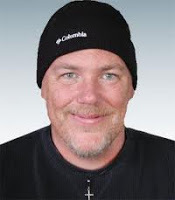
This is Rob Guthrie, in his famous black cap – note: it'snot famous in Colorado because everyone wears one 365 days a year.
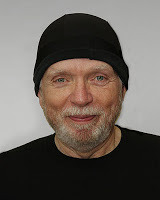
This is me, wearing my black cap, on a cold night inHuntsville. Notice how much younger I amthan Rob. I cannot understand how anyonecould confuse the two of us.
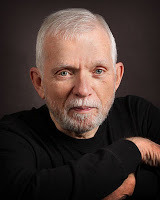
This is my new avatar – photo taken by Adrienne Wall
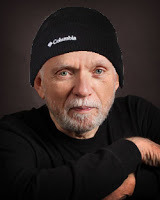 This is the photo shopped version of my wonderfulavatar. By the way, I understand theFBI, aided by Clint Eastwood, is close to discovering the identity of theperson who did this – their search is now centered in the Parker, Coloradoarea.
This is the photo shopped version of my wonderfulavatar. By the way, I understand theFBI, aided by Clint Eastwood, is close to discovering the identity of theperson who did this – their search is now centered in the Parker, Coloradoarea.OK, that should resolve the Carson/Guthrie identityconfusion. Check in here Thursday, Feb 2 and discover why Rob Guthriewrites. Then go here and find out whyBert Carson writes.
January 22, 2012
Firewalking
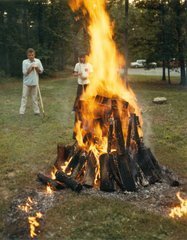
Long ago, and not so far away, I was a professional speaker,
had a perm, and led firewalks (see the photo).
I didn’t intend to be a firewalk facilitator. In fact, I never intended to walk on fire. But stuff happens. During my years as a professional speaker, my
ex and I conducted workshops all over the U.S., Canada, Mexico, and few exotic
places, like Tahiti. In response to many
requests, we decided that it was time to do a few workshops at home –
specifically at Desoto State Park, Mentone, Alabama.
The first one was so successful, we decided to conduct one
every six months. One of the first
participants suggested that we should have a firewalk at the Mentone workshops. Since neither of us knew how to do that, we
began searching for someone who did. We
asked a lot of people for recommendations and the name Parisha, a Cherokee
medicine woman, kept coming up. I contacted
her and she agreed to do an afternoon session at our next workshop and lead a
firewalk in the evening.
Parisha’s seminar and firewalk were a roaring success, no
pun intended. I told her I wanted to
learn how to lead a firewalk. She agreed
to teach me. Six months later, at our
next seminar, Parisha allowed me to assist in all of the outside things that
are necessary. At various points in the
outside preparation, she would leave me and go back in the cabin where the
participants were gathered. The final
step of the fire preparation is raking the coals out. Keep in mind, the temperature of the firewalk
path is 1,200 – 1,400 degrees. It’s hot
work. I had been at it for a few minutes
when Parisha came up beside me. I
stopped raking when she put her arm around my shoulders, and indicated she
wanted to whisper something in my ear. I
will never forget thinking, this is
it. I’m about to learn the secret of
firewalking.
I leaned over as she stood on her tip toes and whispered, “Bert,
If you don’t straighten up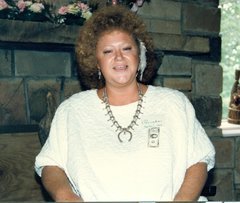 some, you’re going to blister your face.”
some, you’re going to blister your face.”
“Thanks,” I said, and we both laughed.
Before she left, I gave her the date of the next firewalk,
and she agreed to come and give me my final instructions. A couple of weeks before the appointed time,
I called her. and she assured me she would be there. Two days before the firewalk, she called and
said that she had an ear infection, and her doctor would not let her fly. Then she said the words I did not want to
hear, “You can do it, Bert. You know all
there is to know about leading a firewalk.”
I was nervous until I began laying up the wood. At that point, I knew Parisha had been
right. I could do it. And, I did do it. Later, I called Parisha to report my
success. When she answered, I said, “How’s
the ear infection.
She laughed and said, “What ear infection.” Then we both laughed, and I knew she had
taught me the ultimate firewalking secret.
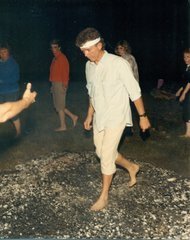 I’ve facilitated dozens of firewalks since that night. Probably the most memorable one I’ve led was
I’ve facilitated dozens of firewalks since that night. Probably the most memorable one I’ve led was
the one I facilitated alone. My ex was
leading a tour in England and took that opportunity to lead a firewalk for the members
of Vietnam Veterans Southern Command and their spouses and children. There
was no one to take the group into a cabin, and fill them with the knowledge
that would protect them during the ceremony.
So, as I tended the fire, I talked to the participants, sitting on the
ground in front of me, watching the fire burn down. When
it was time to walk, all but one of them actually walked across the coals.
The one, who didn’t, Kenneth Lands, a crewman on a
Riverboat, in Vietnam, pulled me aside afterwards. With tears streaming down his face he thanked
me and added that the firewalk had been the most meaningful thing he’d done
since leaving Vietnam.
The last mission Ken was part of in Vietnam was inserting a
U.S. Navy Seal team far behind enemy lines half way between Vung Tao and Saigon. As the bow of the boat grounded on the beach,
hell broke loose. Ken was blown into the
river during the first wave of the ambush.
When he surfaced and looked back toward the flaming boat, he saw two
rockets go totally through the plywood hull of the craft. He heard his buddies screaming, and he saw
most of them die. Minutes later, two
more Riverboats arrived and repelled the Viet Cong. Badly wounded, Ken was treated at an Evac
Hospital and flown to Japan for a long recuperation. He told me the story through tears and then
added, “This is the first time I’ve been close to a fire since that night. I feel like I have traveled a long way toward
shaking those memories out of my mind.”
Walking on impossibly hot embers is not life changing. However, achieving the level of concentration
that is necessary to successfully walk a ten to fifteen foot path of glowing embers
is transformational, if done properly.
To firewalk successfully, a participant must follow their guidance
(intuition) and walk when they know it is time, and refrain from walking until
they have that knowing. That is why Ken
Lands experience was as powerful as the experience of those who actually walked
across the coals.
The lesson of the firewalk may be experienced without
actually participating in one.
Consciously do what you know is yours to do. Consciously refuse the things you know are
not yours to do. That will make you a
firewalker.
January 21, 2012
Dewberry
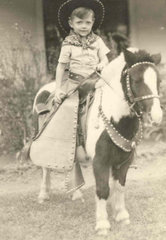
This is Dewberry at age four. That was his age when we first met fifty-nine
years ago. On that day, I was ten. I lived with my parents, and my baby brother,
in Trussville, Alabama, about ten miles east of Birmingham, where I was born.
In Birmingham, I knew every kid on my
block and there were a lot of them. I
lived two blocks north of My Mama and Paw Paw, my Daddy’s parents, and one
block east of Mama and Daddy King, my mother’s parents. It was a great set up for a kid. Then we moved to Trussville, where I didn’t
know a single person.
I was pretty miserable and I didn’t see
things getting better anytime soon. It
was late summer and I was walking the five blocks from my house to the
playground. Actually I was shuffling
along the sidewalk in the general direction of the park but entertaining the
idea of going to the library instead. I
had my head down, looking for grasshoppers in the sidewalk cracks when someone
called out, “Young man, do you have a minute.”
I looked up and saw a woman, about my
mother’s age, in the backyard of a house where I’d never seen anyone
before. In fact, I had thought it was
vacant. She smiled and I stopped walking toward the park and edged
closer to her. That’s when I saw
Dewberry for the first time. He stepped
from behind the woman, looked at me and grinned shyly. I was staring at him, trying to figure out
why he looked so familiar, when the woman said, “This is Dewberry. Do you mind taking him to the park with
you? He won’t be any trouble.”
I didn’t hesitate. I was about the loneliest kid in the
world. “No ma’am, I don’t mind at all.”
We went the park and we stayed there
the rest of the morning. When I realized
that it was almost lunch time, I said, “Dewberry, I’ve got to go home now. Come on.
I’ll take you home.”
We got to the house and there was no
one in sight. I knocked on the door and
no one answered. I looked at Dewberry
and said, “Is this your house, Dewberry?”
He smiled and shrugged.
I tried another tack. “Was that your mother, Dewberry?”
You guessed it. He smiled and shrugged.
I stuck out my hand. He took it and we walked home together. We’ve been together ever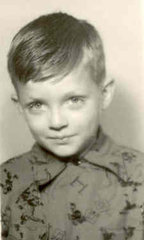 since. A strange thing has happened over the
since. A strange thing has happened over the
years. I’ve gotten old, at least on the
outside, but Dewberry is still four years old.
See what I mean. This is his most
current “dress up” picture – it was taken last October.
A couple of hours ago we were running;
actually, I was running and Dewberry was riding along on Baby Scout (Dewberry named
him after Tonto’s horse, Scout), when I said, “Dewberry, it’s time for me to
write another blog; any idea what I should write about?”
He smiled and said what he always
says. “Me. Write about me, Bert.”
I think I surprised him when I said, “OK. Maybe it’s time to do that. You have to understand though, only special
people will believe what I write about you.”
He smiled again. “That’s OK, Bert. Special people are the only ones who matter.”
Dewberry is like that. He always says what he thinks. In fact, there is no difference in what Dewberry
thinks and what he says. I suppose it’s
a good thing that only special people can see and hear him.
I know there are people who will say, “Bert,
you’re way too old for an imaginary friend.”
I agree with those people totally, and I
don’t have an imaginary friend. I have a
four year-old buddy whose name is Dewberry.
He’s been with me for fifty-nine years and he will be with me for the
rest of the trip.
Once, a long time
ago, Dewberry told me that all special people have a little buddy. And he And
he asked me to tell yours that he said, “Hello.”
January 20, 2012
racism is not a point of view
For the first time, in more than 100
blog posts, I’m not using an illustrating photo. The reason is simple; the pictures would be
too shocking, too revolting, too despicable.
That’s what racism is and it’s much more than that. Racism is the immediate and real
manifestation of the worst evil that exists in the world today. Racism has kept humanity on the brink of
total destruction since man has developed the tools to totally wipe itself off
the face of the planet.
Racism is insidious. If you aren’t infected by it, you can be sure
most of your friends, most of your family, most of your neighbors, almost everyone
else, is. I know that from more than 69 years’
experience. Racists are not born. There are no racists children. Racists are created; here’s the recipe for turning
an innocent child into a racist. First
you must teach them to blame someone else for all of the less than pleasant
manifestations in their lives. Then you
must give them someone else to blame for those manifestations. If you do that really well, you will create
fear in the child and that fear must have an outlet. The outlets of the racists range from
segregation to war to genocide and from favoritism to deprivation to hanging.
As a child, my immediate family was
made up of more than 100 people; 97 of them were racists. It doesn’t take a Rhodes Scholar or a rocket scientist
to see that the odds of me being a racist were at least 97%. So much for the odds: I’m not a racist and I’ve
never been tempted by racism. The primary
reason I’m not a Racists is simple; my father, and both my grandfathers weren’t. There were no racists debates, arguments, or
fights in my family when any one of those three was present. Think about that for a second. The three men who weren’t racists were so
grounded in their personal Truth that racism was never a topic or even a
conversational innuendo when they were present.
Those three men, without a word or a
demonstration, inoculated me against the most invasive of all viruses – racism. I owe them everything for that, but I’m
wondering if I’ve failed them. I’ve been
wondering that since an acquaintance forwarded an e-mail to me last
Monday. The message was a justification
for white racism, a dark force that cannot be justified. I deleted the message and e-mailed:
“I’m
surprised that you would read this and even more surprised that you would
forward it to me.”
The response was, and I quote:
“And
that, as you know my dear friend, is why people have died to protect this
country. So that we can each have a different point of view.”
That brings me back the title of this
post – Racism Is Not a Point of View.
It isn’t. Not by any stretch of
the imagination. Racism poisons the mind
of those who have embraced it, and it kills those toward whom it is aimed. We are a band of more than seven billion
people, sharing a rather small planet, in an obscure corner of the
universe. We cannot much longer endure
the evil, the racism that threatens to destroy us all.
We must, as individuals, look inside
ourselves, find every trace of this insidious infection and purge ourselves of
it. Then, and only then, can we stand up
for Truth and for each other. Then, and
only then, will “justice roll down like waters and righteousness like a mighty
stream.” ***
**** Dr. Martin Luther King, Jr. – A
man who understood, practiced, and lived the truth that all men are created
equal.
The Great Dictator is a comedy film
directed by and starring Charlie Chaplin. First released in October 1940, it
was Chaplin’s first true talking picture, and more importantly was the only
major film of its period to bitterly satirize Nazism and Adolf Hitler. In the
film Chaplin plays two characters who look strikingly similar- a Jewish barber
and a dictator who looks like Adolf Hitler. Near the end of the film, after a
series of far-flung mishaps, the dictator gets replaced by his look-alike, the
barber, and is taken to the capital where he is asked to give a speech.
January 17, 2012
The Indie Writer Two-Step to Success
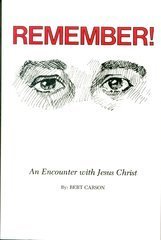
During my years of professional speaking, my ex and I
developed a line of products that we sold, primarily at workshops and
seminars. The assortment of products
included, cassette tapes (yep, it was a long time ago), affirmation cards, and
a book that I wrote and self-published.
I had the book printed by an independent printer in Austin, Texas. My first order was for 5,000 copies. I sold those out in a couple of years and
bought and sold another 5,000. The math
was, the books cost less than $1.00, including freight, and I sold them for
$7.95. Forget the math. I want to talk about selling the book. That
was the simple part. When it was time to
talk about our products I simply held up a copy of Remember: a Close Encounter With
Jesus Christ, and said, “This is the story of Jamie Howard, whose plan
to end his life was interrupted by the appearance of Jesus Christ. Jesus told Jamie there was another option and
then he told him what it was.” I would
pause at that point, look at individuals in the audience and then add, “I’d
love to sign your copy of Remember if you’d like for me to.” That was all the marketing the book needed.
Things are different now.
I’m not a professional speaker, I’m an indie writer. I don’t have a live audience to address and
even if I did, I couldn’t hold up a Kindle copy of Fourth and Forever, or Another
Place, Another Time, or Southern Investigation, and give a
sales pitch and offer to sign copies. So
I’m learning another way. I call it the indie
writer’s two-step.
If you’re an indie writer, you know the two steps. First, we must write; write well and write a
lot. There are indie writers who have
achieved success with one book. Writers
like Robert Bidinotto, whose solo thriller, Hunter, made $100,000.00
over the holidays. However, the odds are
better when you have a numbers of books, like Amanda Hocking’s 12 titles listed
on Amazon, J.A. Konrath’s 53, or Steven Leather’s 38. Note: the number of titles includes all
formats; hardcover, paperback, Kindle, audio….
Well, you get the picture, an indie author must always be writing.
Then there’s the second of the two steps. Indie writers must market what they
write. That’s the step I’m going to talk
about in this post. In the last week or
so, probably just after I read JA Konrath’s blog, $100,000, it came to me that I
should know what the top indie writers have in common, marketing wise. The truth is, I had a suspicion about their
connection, but I wanted to see if it was true.
I picked the top nine indie authors, according to Eli James,
from an eleven month old blog post on his blog, Novelr. They are:
Amanda Hocking 100,000+, Stephen Leather 40,000+, Selena Kitt
20,000+, H.P. Mallory 20,000+, Michael R. Sullivan 10,000+, L.J. Sellers
10,000+, Victorine Lieske 10,000+, J.A. Konrath 10,000+, Scott Nicholson
10,000+. The number following each
author’s name is the number of books sold on Amazon, each month, as of last
February. All I wanted to know was how
many of them are serious bloggers.
Before I tell you about their blogging history, here’s an
excerpt from that post which is enlightening –
The oft-repeated
argument that people use regarding J.A. Konrath, is that he was a traditionally published author before
moving to the Kindle store. But Hocking and her peers, who have never been
published the traditional route before (who were inspired by Konrath’s
exploits, and who are now selling way more than Konrath ever has) are together
invalidating that argument. You don’t have to be traditionally published to
sell a lot of eBooks, and you don’t have to be A-List famous, either.
********
From the list I checked, the blogging history of the top nine. Here’s what I discovered:
Author
2009 Posts
2010 Posts
2011 Posts
2012 Posts
182
130
3
94
155
63
1
Selena Kitt
12
19
23
0
H.P. Mallory
107
40
0
53
55
101
13
L.J. Sellers **
68
55
48
3
Victorine Lieske
23
28
0
J.A. Konrath **
99
99
124
6
24
155
135
7
Six of the nine, the linked ones, are serious bloggers, fine
bloggers. I bookmarked each of their
blogs because they are all great. And
I’ve arrived at this conclusion: those six use blogging to build and
maintain a following. I can’t
think of a better way to accomplish that.
** L.J. Sellers – in addition to the posts noted on the
table, she blogs on Readers Rule and Crime Fiction Collective
which adds greatly to her post total.
** J.A. Konrath - (note – JA’s link will take you to his 1/13/12 post, Reality
Check) – Don’t miss it.
That brings up an obvious question. How do I get my blogs seen and talked about? I’ve discovered the answer to that
question. I began blogging at http://www.bertcarson.com, in January
2011. During 2011 I wrote only 31 blogs
– I’ll do better this year. In fact, so
for this month, counting this post, I’ve blogged 11 times. I’m not sure I can keep up that pace and
finish five books, which I will do, but I will blog 2 to three times every week. From January 2011 – December 15, 2011, I had 8,067 page
visits to my blog. Since December 16,
I’ve had 10,232 page visits. My blogging hasn’t gotten that much
better.
I attribute the difference to Triberr, a twitter app designed by Dino Dugan and Dan Cristo. The concept is simple. When you join a tribe, you see everyone in
tribe’s blog posts, and you have the opportunity to approve or ignore them. The posts that you approve are tweeted to all
the followers of the members of your tribe.
I’m the chief of the Writers and Readers tribe. As of this moment the tribe has 17 members,
with a total of 52,343 followers. That’s
why my blog page views increased by over 100% in the past thirty days.
If you are committed to blogging, and you’d like to join the
Writers
and Readers Tribe of Triberr, email me at bert@bertcarson.com. BTW, there is no charge to join Triberr, and,
you should know I’m thinking that I’ll cut the membership off at 50 – that way
each member will get maximum exposure without spending hours reading and
approving posts.
Good Blogging to You.
January 16, 2012
Martin Luther King and me
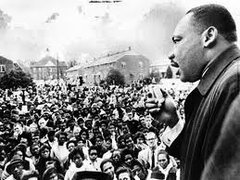
I know where I was on November 22, 1963,
the day John Fitzgerald Kennedy was assassinated. I was taking a nap prior to my wedding,
scheduled for 7 PM at the First Baptist Church, in Palatka, Florida.
I know where I was on November 22,
1964, the day I was inducted in the United States Army. I was on a bus, traveling from Jacksonville,
Florida, to Fort Benning, Georgia. James
Cooper, the first black man that I had ever known, was sitting beside me. James and I talked all night about how race
had affected our perspectives of our shared home town. We started a friendship that night that
continues today.
I know where I was on March 7, 1965
when 17 Civil Rights Workers were hospitalized in Selma, Alabama. I was at Fort Jackson, South Carolina, almost
done with my eight weeks of Advanced Individual Training.
I know where I was on March 9, 1965
when Martin Luther King, Jr. led 2,500 Civil Rights Workers onto the bridge at
Selma and subsequently turned back in compliance with a restraining order. I was in route to Fort Benjamin Harrison,
Indiana, for more training.
I know where I was on March 11, 1965 when Rev.
James Reeb, a Unitarian Universalist Minister, from Boston, MA, died in
University Hospital, Birmingham, Alabama, after being beaten March 9th
following the demonstration in Selma, Alabama.
Note – Rev. Reeb died in Birmingham, a two hour drive from Selma,
because the Selma Public Hospital refused to treat him. I had just signed in at my training unit, at
Fort Benjamin Harrison, in Indianapolis, Indiana.
I know where I was from March 21 –
March 25, 1965, when Martin Luther King, Jr. led the historic march from Selma,
to Montgomery. On the 25th he
stood on the steps of the Capitol Building and delivered his historic speech, “How
Long, Not Long.” In that speech he said: “The end we seek, is a society at
peace with itself, a society that can live with its conscience. ... I know you
are asking today, how long will it take? I come to say to you this afternoon
however difficult the moment, however frustrating the hour, it will not be
long.”
I was in training at Fort Benjamin
Harrison, Indiana.
I know where I was later on the evening
of March 25, 1965, when Ku Klux Klansmen, pulled up beside a van driven by
Viola Liuzzo, a white mother of five, from Detroit, Michigan, who was
transporting marchers from Montgomery back to Selma. They fired into the van, killing Mrs. Liuzzo,
while I slept in the training barracks, at Fort Benjamin Harrison, Indiana.
I know where I was on April 4, 1968
when Martin Luther King, Jr., the most influential American of the past 100
years, was killed. I was in the no
longer existent Republic of South Vietnam, assisting in the perpetration of the
lie that American freedom would be threatened if Communism gained a foothold in
Southeast Asia.
I know where I should have been on
every one of those dates – I should have been walking beside Martin Luther
King, Jr.

